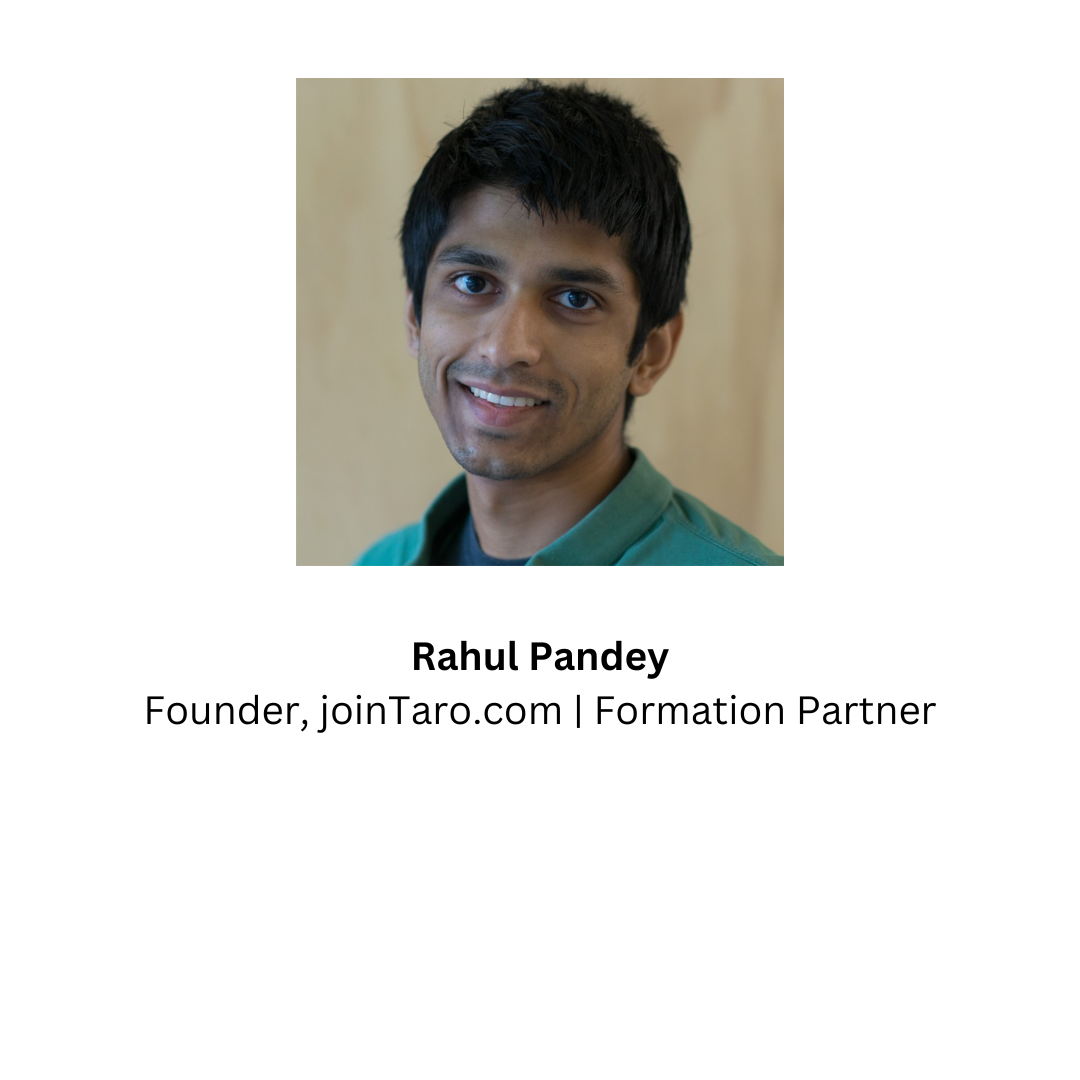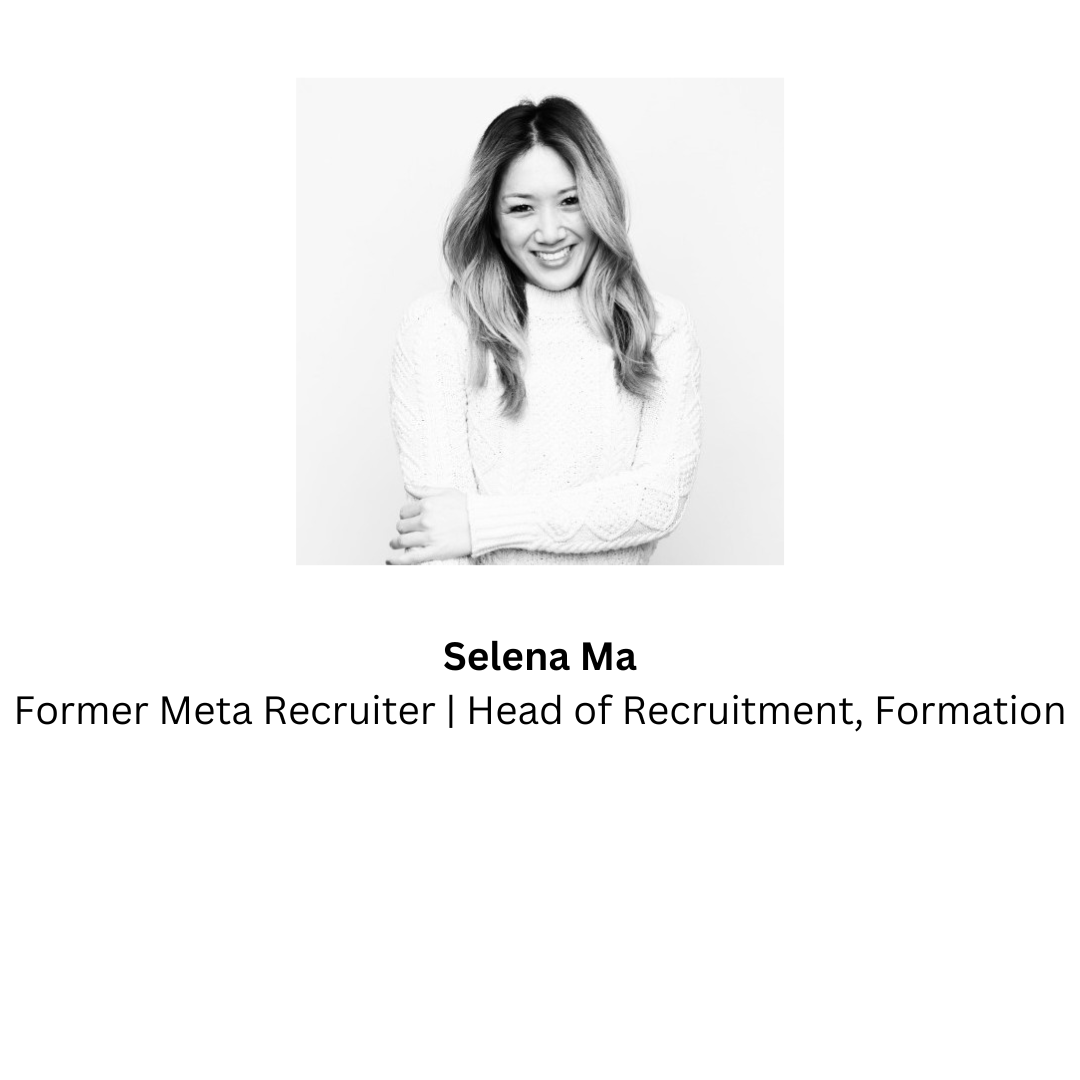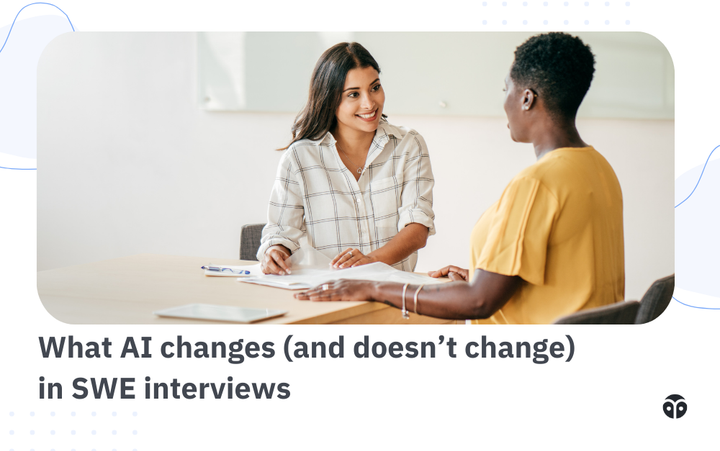Staying True to Your Career Preferences in the Current Job Market, Partnering with Taro
We sat down with some experts in recruiting and career acceleration to hear their perspectives. Plus, learn about our new partnership with Taro!

With the tech job market facing some changes and rough times, it can be hard to stay true to what you want. We sat down with some experts in recruiting and career acceleration to hear their perspectives on the topic. In addition to two experienced technical recruiters (and Formation Mentors), we spoke with Rahul Pandey, founder of Taro, an official Formation partner.



Rahul Pandey - Founder, Taro. Former Tech Lead and Manager at Meta; Adjunct Lecturer at Stanford.
Selena Ma - Head of Fellowship Recruitment, Formation. Former Tech Recruiter at Facebook and Google, Program Manager for Facebook's Intern Program.
Niema Majidimehr - Mentor, Formation. Former Head of Recruitment at Interview Kickstart.
Selena
What advice would you give someone who's considering taking a job they don't love simply because of the current state of the job market?
I would tell them to really stop and think about why they’re taking that job. Is it because they need the money and can’t financially support themselves otherwise? If that’s the case, then that may be the decision they need to make. However, if they have a financial buffer and can afford to continue interviewing and looking for another job, then I’d ask them how they’re thinking about their career progression.
A lot of people think about their careers in terms of the ladder approach, but I like to use the jungle gym approach. If you imagine a traditional ladder, its rungs only go one direction, up and down. Someone climbing it only has one option. Now picture a jungle gym — there are “rungs” everywhere: swings, slides, bridges, monkey bars, etc. Just like a career, a jungle gym offers so many different opportunities to progress through it. A career is not always a linear climb up; in fact, it rarely is!
Someone considering taking a job they don’t really love needs to consider if they’re thinking about their career in terms of the ladder approach or the jungle gym approach. And if they’re taking an offer because they think it’s the only way to get to that next “rung” in their career, then they should evaluate whether that’s actually true after considering the jungle gym approach.
Niema
What are the 3 biggest priorities to look for in a role regardless of the economic climate?
- Culture - Not only do you have to be a good fit for a team but they also have to be a good fit for you. Being on a team and at a company with a culture that fits your preferences provides longevity. Particularly now in this “post”-covid world, people want to work where they’re happy. A Harvard study found that once someone has already thought about quitting a job because of the culture, they’re 80% likely to leave after 6-12 months. The last place you want to work is somewhere with a toxic environment.; you’ll be gone in 6 months!
- Compensation - You want to make sure you’re fairly compensated for the work you’ve been hired to do. But going deeper, you’ll want to consider how many hats you’ll be wearing. Do you anticipate working on more than what's in your job description? If so, there should be a change to compensation to reflect that.
- Communication style - Your own communication style should work well with the team you’re going to be working with. If you can’t communicate and receive communication in an effective manner, then it may not be the right fit.
What advice would you give someone who is considering taking a job they don't love simply because of the current state of the job market?
I would ask them a few questions about their main motivators before I give any suggestions. I’d ask:
- Is not having a job going to significantly affect you financially? If so, do you have a savings account you could live on or a partner who can support you while you find your next role?
- Can you mentally handle working a job that you don’t necessarily love? In the 2008-2009 crash, many big tech companies took about a year and a half to recover. If you’re considering a job at a company that would be a good move for your resume building, can you handle the rough patch that the company/economy is going through and grow upwards from that? Will you have the support you need to do your job while being fairly compensated?
- Can you take this role without it affecting your personal life? I know many people who work at companies where they’re expected to work 50-60 hours per week. Some people love that, but if that’s not you, then you have to decide if it’s worth building your resume/profile and taking the job.
Based on the answers to these questions, I’d make a suggestion but would remind them that ultimately this is their decision and they should do what is best for them.
What do you think is the biggest priority people consider before accepting a role?
Culture and being rewarded for what you do. Before Covid hit, I think a lot of people prioritized compensation. But I think people really want to be happy where they work now. With the more recent layoffs at big tech companies, I think priorities will eventually shift more toward compensation. Although once we get past this rough time, I think culture will take over again as the main priority.
Rahul
What are some tips you'd give to someone who's trying to prioritize their career preferences while job-seeking in this job market?
My general job-seeking advice is to use every unfair advantage you have. This advice is even more applicable now that the tech industry is getting hit hard and the job market is especially difficult. "Unfair advantage" means that you should leverage the experience, interests, and network that you uniquely have.
For example, do you have a former colleague or classmate at a company that is still hiring? Ask them for a referral. Do you have a deep passion for a specific technology or domain, like climate tech or security? Apply to startups operating in that domain and make your dedication in that area very clear.
What's something you think every software engineer should prioritize when applying to roles at companies?
Focus on the people and their values. The specific programming language, tool, and framework will change over time — the people and the culture will have a long-lasting impact on your learning, enjoyment, and future.
What advice would you give someone who's considering taking a job they don't love simply because of the current state of the job market?
Focus on what you can control. There are many elements of a job that may not be ideal: how much maintenance work there is, how well you get along with your manager, and how many growth opportunities you’ll have. You don't need to have the ideal job in order to advance your career. In fact, you'll never have the ideal job. Focus on the parts of the job that you can control and try to maximize your learning and your relationships. Our careers are long — in the grand scheme, a few years won't matter as much.
Taro Partnership
We've long admired Taro for their work with software engineers trying to advance their careers. In fact, we've received some bright folks by way of Taro. Cindy Lam, a Formation alum who documented her Fellowship experience, came to us from Rahul and his team. So we're excited to announce that starting today, Taro's premium members will receive $300 off of their Formation Fellowship.
We’re excited to team up with Taro and work together toward a common goal: to help engineers land roles they love.



